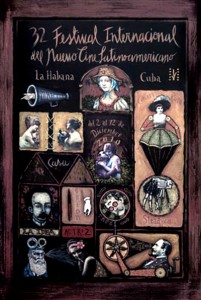 The Havana Film Festival starts on Thursday, December 2. The 32nd International Festival of New Latin American Cinema.
The Havana Film Festival starts on Thursday, December 2. The 32nd International Festival of New Latin American Cinema.
The common people, who go without milk in their coffee every day, count the coins in their pockets; during the ten days of the Festival they can put aside the burdens and sink quietly into that dark magic is the big screen.
Year after year, when December comes, Havana is a sea of people and long lines in various neighborhoods of the city. Elena, 54, often asks for days of work and from 12 noon until about midnight, she jumps from one movie to another and enjoys the latest of the Latin American cinema.
Rogelio, 60, a librarian, has just acquired a 20 pesos (one dollar) ticket book for the central Payret cinema. This book will allow him to see 10 films without having to stand in the long lines (each entry costs 2 Cuban pesos, 0.10 cents).
Apart from a lot of movies from the the continent, in this edition, as usual, there will be European productions. You can also discover the new Canadian films or Independent U.S. productions.
Alfredo Guevara, president of the Havana festival, announced in a press conference that this year the festival will showcase over 500 films, of which 122 will compete for Coral awards. Argentina tops the list with 88 titles in the seven categories of prizes. Followed by Mexico, with 79 and Cuba with 78, including four feature films that aspire to win a Coral.
The homegrown films are: The Eye of the Canary, from the director Fernando Perez; Long Distance, by Esteban Insausti; Ticket to Paradise, Gerardo Chijona; and The Old House, Lester Hamlet.
Guevara also confirmed that the 32nd edition exceeds the previous in numbers of films and is distinguished by the diversity of genres. “We approach the days of the celebration of the intelligence and visual art, at this festival with an overflowing loyal following, which is the greatest gift we could have. Already 32 years. It’s a lot,” he said.
More than 20 works of fiction and 24 operas vie for the Coral prizes. Among the favorites are Brothers, by the Venezuelan Marcelo Rasquin, winner of the Colón de Oro prize this year in Huelva, and Abel, produced and directed by Mexican actor Diego Luna.
Despite the poor condition of several theaters and the common problems of public transport, film festivals are always well received by the Cubans. For moviegoers it is a unique opportunity: the rest of the year, movie listings are quite poor on the island.
And for those who do not have the cinema as one of their priorities, is an opportunity to clear their heads, take the wife and go to the movies and eat peanuts or popcorn.
Then, off, to buy a hot dog and watch the sunrise sitting on the wall of the Malecon. One way to escape the economic crisis. It is also in December. Month of wrapping-up. And best wishes.
